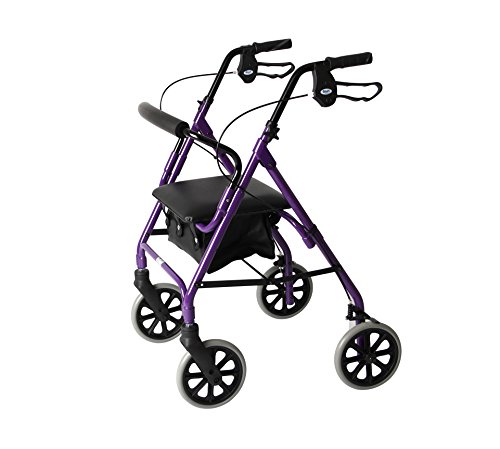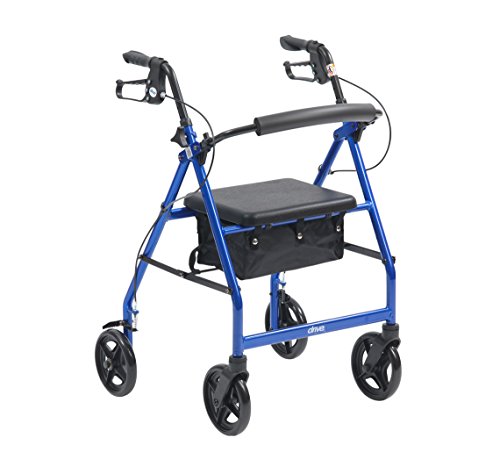See What Rollator Mobility Walker Tricks The Celebs Are Utilizing
페이지 정보

본문
 Rollator Mobility Walker
Rollator Mobility WalkerRollators are a great choice for those with mobility issues and require stability when walking. They come with large wheels and a space for seats built into their frames.
 This model has cushioned handles that provide the feeling of comfort and ease pressure on your hands. It comes with adjustable height handles and clever loop locks that stop the walker from moving when you're sitting or lying down.
This model has cushioned handles that provide the feeling of comfort and ease pressure on your hands. It comes with adjustable height handles and clever loop locks that stop the walker from moving when you're sitting or lying down.Comfort
If someone has suffered an injury that affects their gait and balance or recovering from knee, hip, or other lower-limb surgeries, or injuries, a rollator mobility walker can assist. These walking aids offer stability and support, allowing users to walk more comfortably and stay active with their family and friends as well as the community.
They are available in a variety like the traditional walker with wheels that appears more plain than a walker that is rolling. Walkers have handles set at a height which is most comfortable for the user. This makes them ideal for those who require a solid support but wish to be able to move more easily with the aid of a cane.
The wheels on a walker that roll make it more flexible and easier to use than a regular walking device. The wheels are closer together, so it is easier to steer and maneuver the device in tight spaces. Additionally, they can also be swiveled to increase the speed of going up or down steps. A lot of rollators have seats and a crossbar to provide users with a place to sit down when they require.
The handles of a rollator walker foldable could be constructed from materials that vary in texture and thickness. Grips made of plastic can be difficult for people who suffers from arthritis So, look for soft and smooth handles that are comfortable to hold. Additionally, consider whether the model you pick has loop-lock brakes or lean-activated breaks that can accommodate different hand strength levels.
Stability
A good rollator walker needs to include a comfortable and wide seat that users can take a break from walking. It should also have comfortable, ergonomic grips and brakes that are simple to operate. These grips should be cushioned, and they should be comfortable for people with wrist or hand problems. Some models include a padded backrest for additional support. You should choose the walker that has a weight capacity that is adequate for your needs, and adjustable handles to fit your height.
A locking mechanism on the walker is vital for those who travel often or have to carry the walker in and out of their vehicle. It will help to prevent the walker from being accidentally opened while traveling, preventing injuries and other harm. Another thing to think about is whether the walker is parts that can be removed and exchanged, which allows you to customize it to suit your needs.
In a recent study, researchers looked into how task-performance strategies and device load affect the the stability of users of rollators. Ten participants performed six tasks using an instrumented rolling cane. The team measured the system's Stability Margin, which is the combined centre pressure and base support. The team discovered that SM decreased significantly when a person was asked to do other tasks than straight line walking. They also found that leaning against the device can increase the centre of pressure at the base of support. This can increase or decrease stability. The authors conclude that the findings can be utilized to improve the rollator training. They suggest that greater focus should be placed on activities that are not straight line walking and on the specific strategies used to achieve the goals of each exercise which can help or impede stability.
Weight-bearing capacity
A rollator walker can hold up to 300 pounds or more, depending on the model. Its sturdy frame and four wheels aid people in maintaining their mobility and balance, especially for those suffering from medical conditions or who are aging. Rollators are more maneuverable than standard walkers, which require users to lift their weight to move forward. This reduces hand fatigue.
The wheels on a rollator usually vary 2 in 1 rollator size from 6 to 10 inches in diameter, providing users with the flexibility to use it for indoor and outdoor use on various surfaces. Some models come with a variety of height options for different users. Others fold up to make it easy to transport and store. Certain models come with a seat that allows users to rest while walking.
Many walkers include a variety accessories. For example a tray for walker or basket for holding personal things. Other accessories include a wrist guard to shield hands from injury and bags for walker users to carry additional items. Certain walker frames can be transformed into wheelchairs when the mobility needs of a person change.
A bariatric rollator is constructed with a heavy duty frame and a wider seat to safely support larger people. It comes with adjustable height handles and a wide padded backrest, as well as locking hand brakes to provide maximum safety and security. The angled bars for the handle keep the hands in a neutral place to avoid fatigue and stress and fatigue, while the convenient storage strap allows it to easily fit into a trunk. Its durable 8" wheels are fitted with anti-tip technology that provides more stability and maneuverability and the padded seat provides a comfortable way to rest while on the go.
Brakes
A rollator is different from the traditional walker. Rollators have wheels that can be controlled independently by hand brakes integrated or located below the handlebars. This design allows you to maneuver through tight spaces and make sharp turns left or right. However, the brakes could occasionally become sloppy or difficult to use, which can be a safety issue for those with declining mobility and weak hands.
To avoid these issues, many manufacturers offer the option to include brakes that are locked to provide security and stability. This feature is especially useful for those who have trouble getting the brakes to squeeze or applying pressure due to a weak grip or other health issues such as arthritis. There are some differences in the method by which locking brakes are set up, but most walkers use similar steps to ensure they are set correctly.
Before attempting to adjust the lock brakes it is advised to read any maintenance instructions that come with your mobility aid to find specific instructions. To begin, find the adjuster screw for your brake or knob that is usually close to the grips on the handle. Then tighten it by turning clockwise. This is crucial because if the adjuster has not been tightened correctly it won't be possible to remove the slack from the cable. Then tighten the lower cable adjuster by using the same procedure. After you have completed these adjustments test the brakes by squeezing them gently and see if they respond properly. If they do not it means that the locking mechanism is likely faulty.
Accessories
There are many accessories for the rollator walker, such as cup holders and baskets. Certain accessories are designed to carry objects while walking, and others, such as the Mobility Phone Grip clip onto the bars that are vertical on a walker, or wheelchair, and expands to hold the phone. The grips can also be adjusted to the ideal height to hold your phone. A lot of these devices are designed to be lightweight and simple to use, which makes them ideal for those with arthritis or other hand injuries.
Most manufacturers of walker and rollator offer a range of handle heights, allowing you to choose the best one for your body type. It is also important to think about the capacity of a rollator's weight, as this can impact how well it works for you. Some manufacturers offer bariatric models that can support up 500 pounds.
When choosing a walker or rollator wheel chair, it is important to take into consideration the type of brakes. The brakes that are pushed down work by putting downward pressure on the frame to stop forward motion. Loop brakes work similarly, but require both hands to be used and a bit more force. Both types of brakes are an essential security feature, therefore it is essential to choose the appropriate choice for your needs.
Consult a doctor, a physical therapist or occupational therapist if you are unsure of which model of walker or rollercaster would be best for you. They can give you information on the features that are most beneficial for your situation and help you find a model compatible with any other equipment you have in your home or stored.
- 이전글Ten Pinterest Accounts To Follow Seo Optimization 24.11.26
- 다음글Web Link Login Toktokbet Ikuti Eksamen Ini Dan Juga Kamu Hendak Menatap Persabungan Anda. Secara Lurus 24.11.26
댓글목록
등록된 댓글이 없습니다.














